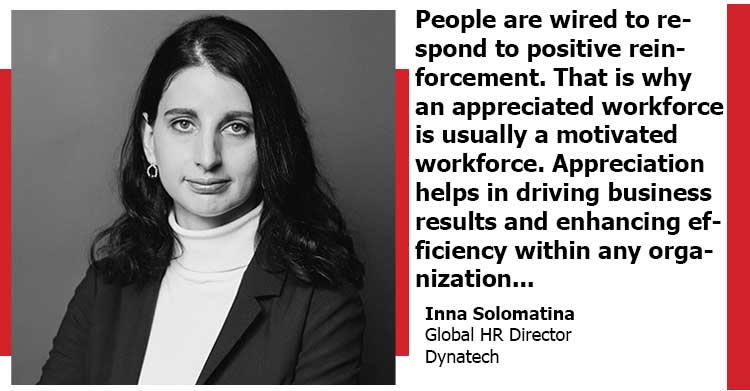Why Employees Need Both Financial and Non-Financial Rewards | Inna Solomatina | Global HR Director | Dynatech

People are wired to respond to positive reinforcement. That is why an appreciated workforce is usually a motivated workforce. Appreciation helps in driving business results and enhancing efficiency within any organization. Perhaps that’s why companies emphasize on positive reinforcements such as employee rewards, recognition, engagement and job enrichment to foster a corporate culture.
While monetary benefits are still considered among the top rewards, it is safe to assume that employees today require motivation that goes beyond the conventional monetary benefits. It is important to note here that this is not a case of whether financial rewards are better than non-financial ones. A competitive remuneration could still be among the top factors in attracting talent, but it takes a plethora of non-financial rewards as well to retain that talent. For instance, employee recognition, job empowerment, hybrid work mode, flexible hours, and conducive work culture are some of the most impactful non-financial rewards.
Employee Recognition – I believe that managers play a pivotal role in this case. The common perception, which is largely true, is that financial motivation is a responsibility of the organization. However, non-financial rewards are a direct responsibility of the managers. Acknowledging a well-performing team member, one-on-one and publicly, seems like a small gesture. But it goes a long way in strengthening organizational belonging. Small tokens of gratitude for employees’ efforts also help instil a sense of pride and belonging. A small ‘thank you’ note from the manager is sometimes ideal for boosting individual and team spirit. Managers who ensure their direct reports feel appreciated and engaged often enjoy a collaborative team culture as a direct result.
Job Empowerment and Enrichment: Another substantial reward organizations can offer their employees is job empowerment and enrichment. When an organization trusts its employees, they feel empowered to explore new responsibilities and tasks. The sense of accomplishment that accompanies job empowerment further enhances employee loyalty.
Culture and Values: The ultimate objective behind designing and implementing any kind of reward should be engaging employees so that they are motivated to work with an organization, not only because it pays more than the competitors but because it provides an environment that fosters personal and professional growth. I firmly believe that building a work culture that is conducive to employees’ growth and aligns with their values is also a reward. When an organization’s cultural values resonate with employees, they feel motivated at work. There is a sense of belonging and purpose which drives them to go above and beyond at their chosen place of work.
Besides financial rewards, additional leaves, elevated holiday time, flexible hours, and hybrid work mode are some of the non-financial rewards which organizations can explore.
At Dynatech, we have been implementing a wholesome amalgamation of the above-mentioned points, the impact of which reflects on our hiring and retention data. The fact that at least 30% of our workforce has been working with us for more than five years shows that employee rewards go way beyond just financial benefits. Moreover, three to four former employees come back to Dynatech every year after having worked somewhere else.
Employers must always be aware that motivation changes over time. Something that motivates, engages, and retains employees today might not be effective tomorrow. The key is always to keep an ear to the ground. One-on-one meetings, focused group discussions, and exit interviews are some of the avenues to stay abreast with the trends that dictate employee motivation. Constant communication with the employees to gauge the evolution in their motivation helps organizations course correct. After all, an organization is just as good as its employees.


